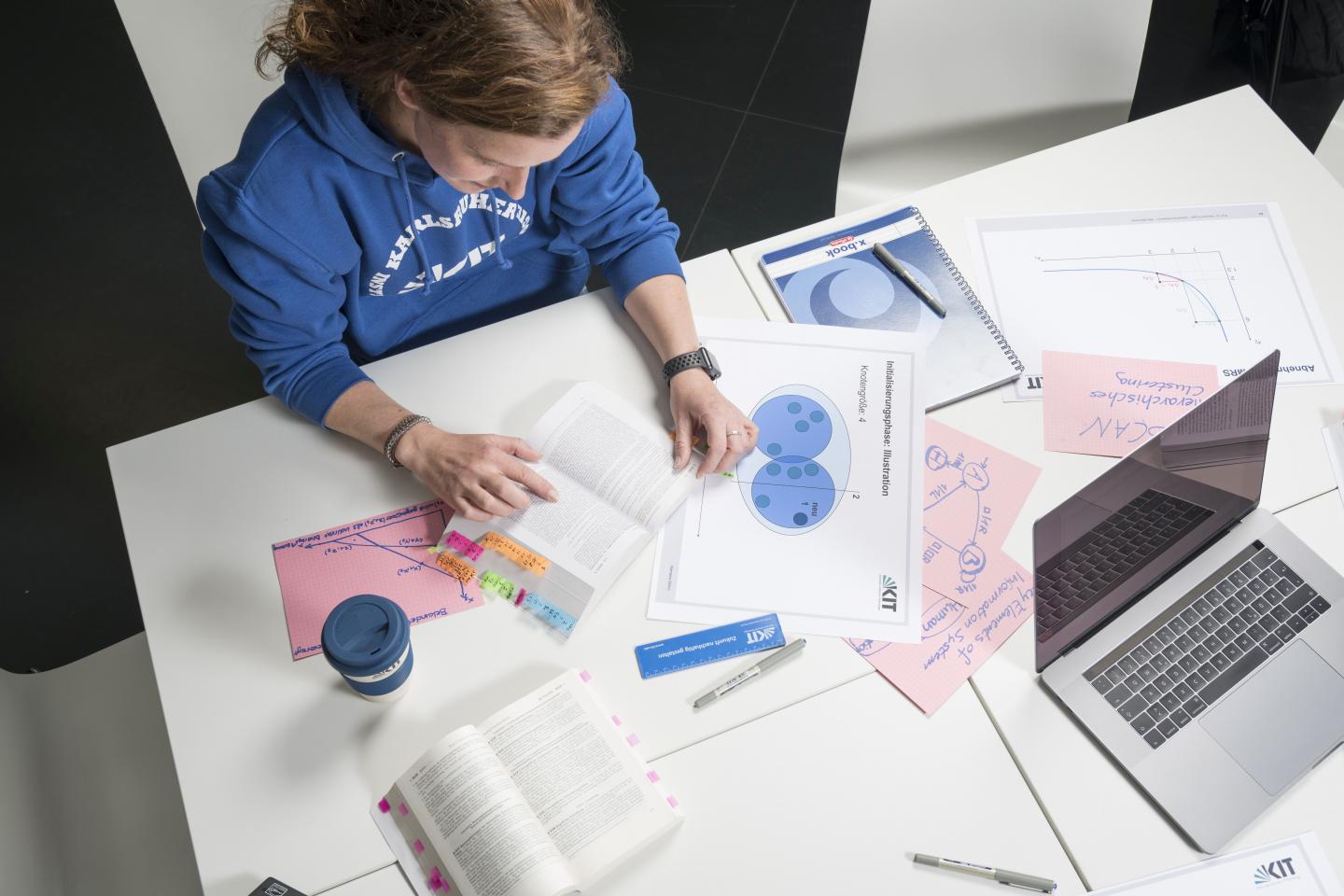AI-based competence assistance systems are to help achieve phases of concentrated work and to actively unfold personal and professional competences

Credit: (Photo: Markus Breig, KIT)
Not only artists have creative periods. Also at workplaces, people may get absorbed in work and enter a state of high concentration – the flow – that may lead to increased well-being, satisfaction, and performance. The “Kern” project coordinated by Karlsruhe Institute of Technology (KIT) focuses on generating or maintaining this state. It develops an assistance system that uses AI to recognize flow based on cardiac frequency or skin conductance. It is aimed at shielding persons against disturbances or developing competences to support flow. The project is funded by the Federal Ministry of Labor and Social Affairs (BMAS) with EUR 1.36 million.
“Automation and progressing digitization of the value added chains quickly change our work environment,” says Professor Alexander Mädche of KIT. “Modern competence and education management has to support employees in the specific development and use of their competences at the workplaces.” The project Kern (German acronym of developing competences and properly using them in the digitization era) conceives competence assistance systems (CAS) for the future working world and uses methods of artificial intelligence (AI).
The projects centers on the human being. It is most satisfied and productive, if it can pursue its activity undisturbed and its capabilities optimally fit to the requirements of work. This is the basic assumption of the project. A major part of the project therefore focuses on the flow of the human being. Flow refers to a state in which a person gets completely absorbed by a task and is highly concentrated. This state may lead to increased well-being, higher satisfaction, and increased performance. The “Kern” project, hence, is aimed at not disturbing or even supporting and maximizing flow at work. For this, however, flow first has to be recognized reliably.
Within the framework of the project, test subjects will wear a wristband or chest strap with sensors measuring e.g. cardiac frequency or skin conductance at their workplaces. These physiological data form complex patterns that may vary considerably from person to person. Novel approaches based on AI are required to recognize flow patterns in real time. Recently, a working group of KIT for the first time succeeded in classifying flow on the basis of physiological data using a neuro-evolutionary deep learning approach, a method of machine learning.
On this basis, the project will then develop the prototype of an AI-based CAS that is to provide situation-related feedback. If desired, this may even result in emails and messages being delivered such that flow is not disturbed. If the system recognizes that productive work is disturbed for a longer time, because the tasks no longer correspond to the competences of the employee, it proposes personal competence development methods. The “Kern” project conceives education formats for managing tasks as well as for strategic personal development. They may range from short messages with tips for daily work to digital assistance to personal advising by a human expert. In analogy to navigation systems in the car, AI-based CAS make situation-dependent recommendations for actions and propose concrete learning or working units, for instance. The final decision for selection, however, always lies with the employees.
Systems that support and advise employees in real time based on physiological data have a great innovation potential for the digital worlds of life and work. At the same time, they interfere with the private sphere. For this reason, the project also includes a joint process for the employees, their representatives, and the company management to identify solutions and guide rails of the developing technology. “I am firmly convinced of AI-based CAS having a great potential. However, we have to understand and design them as socio-technical systems,” Mädche says.
CAS are to help employees further develop during their working life, ideally in a specific and interactive way. “Through the development and test of an AI-based competence assistance system, learning of competences is directly embedded in the context of work and the contents are adapted to the personal preferences of the employee,” says Jannik Keller, Managing Director and founder of Campusjäger GmbH. Modern CAS, such as those developed in the “Kern” project, are to equally consider individual needs and company goals and create a framework, in which employees undergo training in an economically efficient and motivating way and optimally extend their competences. In this way, employees can be supported constantly and optimally and organizations can be adapted much better to the rapidly changing requirements of the digitized world.
The project is coordinated by KIT and executed in cooperation with SAP SE, TÜV Rheinland Akademie GmbH, Campusjäger GmbH, and B. Braun Melsungen AG. Under the New Quality of Work Initiative (INQA), the project is funded by the BMAS with EUR 1.36 million and implements an exemplary innovation space for Work 4.0.
###
More information:
Video interview of coordinator Alexander Mädche:
https:/
Information on the “Kern” project: https:/
Website of the research group of Alexander Mädche: http://issd.
More information on the BMAS innovation spaces: http://www.
Press release of BMAS on the start of funding: https:/
More about the KIT Information · Systems · Technologies Center: http://www.
Press contact:
Justus Hartlieb
Redakteur/Pressereferent
Tel.: +49 721 608-21155
[email protected]
Being „The Research University in the Helmholtz Association”, KIT creates and imparts knowledge for the society and the environment. It is the objective to make significant contributions to the global challenges in the fields of energy, mobility and information. For this, about 9,300 employees cooperate in a broad range of disciplines in natural sciences, engineering sciences, economics, and the humanities and social sciences. KIT prepares its 25,100 students for responsible tasks in society, industry, and science by offering research-based study programs. Innovation efforts at KIT build a bridge between important scientific findings and their application for the benefit of society, economic prosperity, and the preservation of our natural basis of life.
Media Contact
Monika Landgraf
[email protected]
Original Source
https:/



